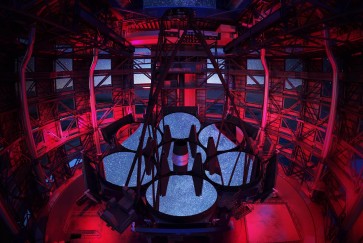Facing no shortage of challenges in 2020 — a global pandemic, protests around racial justice and a contentious presidential election — Northwestern scholars, researchers and experts have made great breakthroughs, contributions and discoveries.
They’ve found a new way to clean up oil spills, uncovered the limits of free market capitalism in a society with significant inequality, revealed that inside every human is a small amount of star dust and worked to bring equity in education to Chicago children.
Here are several examples of what Northwestern experts are doing now to make the world a better place in the year ahead.
Tackling complex tasks with AI

An experiment involving more than 100 swarm robots brought driverless cars one step closer to reality. Engineer Michael Rubenstein developed an algorithm that allows the robots to safely navigate around one another without crashing or getting caught in a traffic jam.
Plus, medical professor Yuan Luo developed an artificial intelligence model that can detect a subtype of autism before the patient presents any symptoms. Use of this tool could allow for early intervention during a period of critical brain development.
Rethinking assumptions on racial progress
Researcher Ivy Onyeador found that white Americans vastly overestimate the amount of progress that has been made on racial income inequality since the 1960s, which could have major policy implications when addressing racial injustice.
Plus, economist Piotr Dworczak discovered the limits of free market prosperity, finding that, in contrast to classic economic theory, sometimes price controls achieve a more optimal outcome than competitive markets — especially when there is significant societal inequality.
Protecting the safety of our water

Engineers developed a new way to clean up oil spills without harming marine life. Vinayak Dravid’s magnetic sponge selectively absorbs oil in water. It can hold up to 30 times its own weight and can be reused dozens of times without losing its effectiveness.
Researchers led by engineer Julius Lucks have created an inexpensive, handheld device that enables anyone to quickly and easily assess the safety of their own water for a range of contaminants such as lead and pharmaceuticals. Similar to a pregnancy test, the device gives an easy-to-read positive or negative result when it detects a harmful level of contaminants.
Power charging the battery
No more worrying about dead batteries. Engineer Josiah Hester developed a Game Boy that’s powered by solar energy and pushing buttons to play. The adapted gaming system represents an important step in reducing our reliance on environmentally hazardous batteries for consumer electronics.
Breaking down barriers in the community

More than 200 Chicago community organizations are coming together in a new digital space designed by learning sciences expert Nichole Pinkard. MyChi. My Future. gives children the opportunity to explore their passions in youth-centered, out-of-school experiences that will lead to more equity in education.
Plus, Northwestern artists brought the magic of the stage outside this summer, parading along the beach and dancing among the trees as a way to bring harmony and connection to Chicago neighborhoods during the pandemic.
Exploring deeper into space

Astrophysicists discovered an object in the universe that they previously thought didn’t exist — an intermediate mass black hole with a mass 142 times that of the sun. Vicky Kalogera, Christopher Berry and Chase Kimball contributed to the detection, made using gravitational waves.
Plus, astronomers learned more about the origin of stardust in our bodies. Raffaella Margutti led a team that studied the most calcium-rich supernova ever seen. These rare events are the source of calcium in the universe, including in our teeth and bones.
Checking our use of drugs and chemicals
In an unprecedented study of Medicaid insurance claims over a decade, Northwestern Medicine researchers found 45% of antibiotics were prescribed without a good reason, which raises questions about efforts to curb inappropriate and potentially harmful prescriptions.
Plus, as the repeated use of some hair dyes has been linked to cancer, chemist Nathan Gianneschi may have developed a solution for the growing list of salons and hair color enthusiasts searching for natural and safer alternatives to dyes and cosmetics.
Caring for the most vulnerable

Every year, 15 million babies are born too early. And in low-resource settings, the outlook can be dire. Half of babies born at 32 weeks or earlier will die; whereas in high-resource settings, almost all survive. To help bridge this gap, researchers led by John Rogers have developed a new wireless, battery-charged, affordable monitoring system for newborn babies that can easily be implemented to provide clinical-grade care nearly anywhere. Now, with support from the Bill & Melinda Gates Foundation and Save the Children, the team is deploying the devices internationally, starting with hospitals in Ghana, India, Kenya and Zambia.

